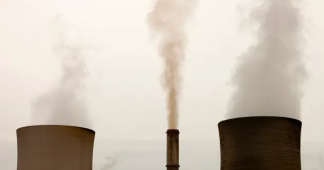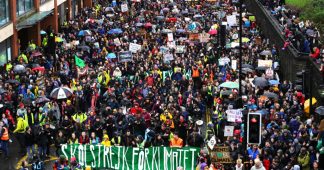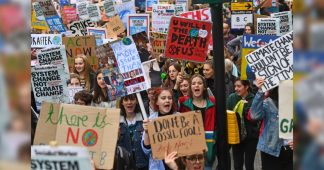Despite the obvious parallels with coronavirus shutdowns, states still show little determination to put in place the measures we’ll need to deal with the climate emergency. For Andreas Malm, we need to stop seeing climate change as a problem for the future — and use state power now to impose a drastic reordering of our economies.
An interview with Andreas Malm
June 15, 2020
Interview by Dominic Mealy
In the space of a few short weeks, received economic wisdom on the bounds of state intervention was turned upside down, as were the day-to-day lives of billions of workers worldwide. Factories and schools have been shuttered, borders closed, and whole populations confined to their homes under threat of hefty fines and imprisonment. Otherwise mundane technocratic leaders have recast themselves as wartime commanders doing battle with an invisible invader.
The dominant media discourse concerning the pandemic has been to cast it as an exogenous shock to business as usual, the origins of which lie either in natural processes divorced from human influence or in the failings of a specific state or culture — generally meaning China’s. Calls have arisen to punish a still-unknown perpetrator, conspiracy theories have abounded, and the international radical left — almost everywhere bereft of actual power — has been reduced to cheering on the draconian lockdowns and dreaming ineffectually of a better world to come.
At the same time, the ongoing climate crisis has been largely erased from the mainstream narrative. Social media has been flooded with images of blue skies over normally smog-eclipsed cities, dolphins skipping through waterways, and wild animals foraging for food in deserted cities. Many environmentally minded observers have expressed hope for a green recovery from the crisis — but also remained largely silent regarding the structural constraints that bar its way.
In an attempt to make sense of the pandemic, its origins, and its consequences for the climate justice movement, Jacobin’s Dominic Mealy sat down with Andreas Malm, a world-leading scholar on human ecology. Author of half a dozen books and innumerable essays on the political economy of climate change, anti-fascism, and struggles in the Middle East, Malm’s works include The Progress of This Storm and the Deutscher Prize–winning Fossil Capital. He is also the author of an upcoming book on COVID-19 entitled Corona, Climate, Chronic Emergency: War Communism in the Twenty-First Century, to be published by Verso Books.
The most important driving force behind the production of pandemics is clear in the scientific literature and it is deforestation — which is also the second biggest contributor to global climate change. The place in which you find the greatest biodiversity on Earth is in tropical forests, and this biodiversity includes pathogens. These pathogens, which circulate among nonhuman animals in wild habitats, do not generally pose a problem to humanity as long as humans stay away from them. However, the problem arises as the human economy makes deeper and deeper incursions into these habitats. The clearance of forests for logging, agriculture, mining, and the construction of roads creates new interfaces where humans come into contact with wildlife. Through these interfaces, animal pathogens are able to mutate and leap into human populations through a process called zoonotic spillover.
Global warming itself also accelerates this trend. As temperatures rise, certain animals are forced to migrate in search of climates that match those to which they are adapted. A generalized chaos ensues in which animal populations — including, significantly, bats — are increasingly brought into contact with human populations, thereby increasing the rate of transmission. While there are upward of 1,200 different species of bats, all share a common trait that makes them unique among mammals, namely their ability to engage in sustained flight. This shared characteristic not only makes them highly mobile and therefore susceptible to climate-change-induced migration, it also requires prodigious amounts of energy, driving metabolic rates to a point where bodily temperatures reach 40°C for many hours on end, a level that would be experienced as fever by most other mammals. This process has been postulated as the primary reason behind bats being the main carrier of pathogens such as coronaviruses. Viruses that settle on these animals must adapt to their feverlike body temperatures. While these pathogens do not impair the immune systems of their bat hosts, they can overpower the immune systems of other animals, if they are able to cross over to them. All across the world, bats are being displaced through deforestation and driven into higher latitudes by rising temperatures, and China is no exception. Bat populations have been increasingly driven into northern and central China and into closer proximity with humans living in high-density populations, thereby increasingly creating new interfaces through which zoonotic spillover can take place.
These are just some of the causal links between the COVID-19 crisis and the climate crisis. While a distinction has to be made, the two trends of global warming and global sickening are interlaced by a variety of different causal factors and, as such, constitute two dimensions of one broader, unfolding ecological catastrophe.
Now, overall, the pandemic has played out similarly to that of global warming in the simple sense that those who have suffered most and those who are most likely to die are the working class — most particularly working-class people of color and those in various hotspots in the Global South. The rich, meanwhile, have been able to self-isolate with ease by escaping to additional homes in the countryside and have been able to access private health care.
However, there is one major difference: the anomaly that COVID-19 also hit the rich at an early stage, with capitalists, celebrities, and political leaders falling ill, people who have no vulnerability to the climate crisis at this stage. Unlike the impact of global warming, the transmission of coronaviruses follows aviation lines and, to put it simply, rich people fly more than poor people. While the pandemic was spread by other channels upon arrival in different countries, aviation provided the primary entry point for the virus, giving rise to the paradox that rich people were among the first to contract the virus. In Brazil, for example, it was the affluent section of society who introduced the virus, but now it is ordinary working-class people who are dying in droves. This has simply not been the case with climate change disasters, and it is one of the key factors that explains the strikingly different reaction on the part of governments.
Normally speaking, from the perception of the Global North, disasters happen in Haiti, in Somalia, or in some other faraway poor place where the people always seem to be living in wretched misery. They have their earthquakes, they have their Ebola and HIV, and this has become simply part of the background noise of modern life. The pandemic, meanwhile, struck affluent countries very suddenly and at an early stage, and hence constituted a threat to the bodily integrity of the very people expected to drive production and consumption at the core of global capitalism, so the state stepped in. Doing so was also, of course, a matter of political survival for these governments. This explains, for example, the sharp U-turn in policy by the Tory government in the UK. After initially endorsing a “herd immunity” strategy, they shifted toward support for lockdown and other interventionist measures after realizing that if they callously let upward of hundreds of thousands of people die, they would pay the political price at the ballot box.
Nevertheless, we have to be honest about the situation we find ourselves in. COVID-19 has brought about the sudden obliteration of the climate justice movement in terms of everything that had been built up by the end of 2019. Since early 2020, COVID-19 has completely paralyzed all the most promising developments in the environmental movement — Fridays for Future, Extinction Rebellion, Ende Gelände, and so on — this is a situation of grave disaster. Prior to this, there had been a growing momentum toward aggressively disrupting business as usual, and while there have been attempts to temporarily move these actions online, there is simply no way to exert the same kind of pressure through digital means. One cannot substitute direct action and mass organization by holding up signs on Instagram. In my view, the digitization of politics has been detrimental to the radical left and beneficial to the far right, so further digitization will bring nothing good for us.
We also have to be realistic about the balance of forces. In much of the world, the general political trend has been toward the rise of the far right. In many countries, particularly in the EU, they have been temporarily sidelined, with voters rallying being their incumbent governments. The interesting moment is now arriving, as lockdown restrictions are eased up. A political thaw is set to take place, with many of the forces that were in motion before COVID-19 set to spring back into life just as the public health crisis morphs into a self-reinforcing economic crisis. The question then becomes which forces will be best positioned to benefit from a situation of mass unemployment and social dislocation. Perhaps I am overly pessimistic, but it appears to me that it will be the far right, simply because it was in a much stronger position prior to the outbreak of COVID-19 and also because the pandemic has reinforced certain nativist political paradigms, in terms of closing the borders, putting one’s nation first, and a suspicion of foreigners.
This poses a serious problem for the environmental movement in the sense that far-right forces — particularly in Europe, the United States, and Brazil — have emerged as one of the strongest and most vocal proponents of fossil capital. They deny the climate science and promote an acceleration of mass deforestation and fossil fuel extraction. It is therefore clear, for example, that if you want to close down coal mines in Germany, you will need to perpetrate a major political defeat against the [far-right] Alternative für Deutschland; if you want to prevent the decimation of the Amazon rainforest, you will need to take on the political movement around Jair Bolsonaro. So, there can be no climate mitigation without a massive defeat of the far right in advanced capitalist countries and in many developing states as well.
A successful strategy to address the climate crisis will need to find a way to weave together environmental justice, working-class struggle, and opposition to the far right. The way out of the unfolding health and economic crisis will be to build a movement capable of achieving a very rapid transition away from fossil fuels, not some green Keynesianism, not a few new renewable investments tacked onto the fossil fuel economy, but the actual destruction of fossil capital itself, including the immediate closure of coal mines and the termination of mass aviation. This can only come about through massive public investment and increased state control over large swaths of the economy. Every crisis is an opportunity for the Left, but we have proven ourselves rather adept at wasting these opportunities in the past.
DM:Can you give our readers an idea of the extent of intervention required to achieve a sustainable green transition?
AM:The level of intervention required is both softer and harder than what has been implemented to combat the pandemic. No one is calling for a lockdown to address climate change, no one is calling for house arrest for entire populations or for the economy to grind to a halt from one day to another. On the other hand, what is required is a fundamental transformation of the energy system and production in a sustained manner over the longer term, not simply a temporary hiatus to the status quo. In order to stabilize the rise of global temperatures at 1.5°C, emissions will have to be reduced by 8 percent a year until you meet net zero. This sort of change is totally impossible to do simply by tinkering with market mechanisms or introducing some carbon taxes; rather, it will require a massive expansion of state ownership and comprehensive economic planning.
DM: How do you answer the objection commonly leveled against such arguments that many utilities companies are already state-owned, yet they continue to be major sources of emissions?
AM:Public ownership is not a panacea in and of itself, but it makes the task of decarbonization significantly easier. The advantage of having utilities under state ownership is that it allows governments to very quickly reorganize them. You do not need to first expropriate them or undertake the task of forcing privately owned companies to overhaul their current practices and leave fossil fuels in the ground.
DM:You are among the leading critics of the notion of the Anthropocene, having instead coined the term “Capitalocene” to describe the current geological epoch. The outbreak of COVID-19 appears to have revived the notion of a shared collective responsibility for the crisis perhaps best encapsulated by the slogan “Corona is the cure, humans are the disease.” How do you respond to this development?
AM: This argument, that humanity itself is the problem, is like a specter haunting the environmental discourse. You find it in the recent Michael Moore documentary Planet of the Humans, you find it in far-right rhetoric, you find it in liberal environmentalist discourse — it is pernicious, deeply erroneous, and politically dangerous. Nothing about the COVID-19 pandemic makes it any more credible than it was before. It is not humanity in general that bears the responsibility for deforestation, global warming, and the wildlife trade, which constitute the primary drivers of increasing zoonotic spillover; rather, it is capital.
The policies employed to deal with the pandemic have sought only to address the symptom, namely the virus itself, while its root causes have been left completely unmentioned and unaddressed. The responsibility for containing the spread of the contagion has been outsourced onto ordinary people, who are then routinely punished if they are unable to self-isolate. You cannot deal with the factors driving these pandemics by appealing to individual citizens to change their ways, just as you cannot address climate change through altering one’s consumption patterns.
Take, for example, palm oil, the cultivation of which is one of the main drivers of deforestation in the tropics, not least in Southeast Asia, where huge numbers of bats and other wild animals are suffering from the encroachment of plantations. If, here in Sweden, I want to eat a piece of flapjack, it is almost impossible to find one that does not contain palm oil, and there is nothing that I, as a consumer, can do about this — the onus is on the producer. Moreover, the majority of palm oil does not go toward products that ordinary consumers buy but is rather used in industrial processes that one cannot even hypothetically change through a shift in consumption.
Such an increase in state power brings with it the danger of bureaucratization and authoritarianism. Indeed, there is already a trend in this direction, with Hungary, for example, using the pandemic to undermine democracy and increase state coercion. Nevertheless, if you have an energy transition brought about by popular forces from below, with social movements having power over the state bodies driving the transition, then this danger can be held in check. While it may seem utopian at this stage, it is important to make the proposition of closing down institutions designed to survey and control populations and repurpose them to attack capital, closing down the sources of global warming and zoonotic transmission. In the book, for example, I propose that we abolish border agencies and turn them into institutions for cracking down on the wildlife trade.
I develop the idea of ecological war communism in the book as a counterpart to the long-standing idea that World War II provides a model for countries to follow in dealing with the climate crisis, a notion that has recently resurfaced in the discourse surrounding the COVID-19 pandemic. My argument is that while World War II mobilization provides a useful analogue, it has some limitations, not the least of which is that the war effort was based on the prodigious consumption of fossil fuels and that it left the position of the capitalist class largely intact.
Addressing the climate crisis and preventing zoonotic spillover, meanwhile, requires emergency action that goes against the vested interests of very powerful factions of the dominant classes and facilitates the rapid transformation of economies. War communism provides an analogue that can be played with — not in the sense of copying everything that the Bolsheviks did during the Russian Civil War, any more than the example of World War II leads us to address global warming by dropping another atom bomb on Hiroshima. Rather, war communism provides an example of a rapid, state-driven transformation of production and the organization of the economy in the face of massive opposition from the dominant classes. A green transition will also require a degree of coercive authority to be imposed on fossil fuel companies that have so far done everything in their power to postpone and obstruct climate change mitigation.
The obvious choice when looking for a tradition that has a concept of using state power in a situation of chronic emergency is the anti-Stalinist Leninist tradition. Built into this tradition is also an insight into the dangers and contradictions of state power that arises from the lessons of the Bolshevik Revolution. The whole strategic direction of Lenin after 1914 was to turn World War I into a fatal blow against capitalism. This is precisely the same strategic orientation we must embrace today — and this is what I mean by ecological Leninism. We must find a way of turning the environmental crisis into a crisis for fossil capital itself
Published at https://www.jacobinmag.com/2020/06/andreas-malm-coronavirus-covid-climate-change











